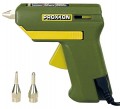Max. power consumption
The highest power consumed by the glue gun during operation. Usually, such power is required by the device for a short time, to warm up to operating temperatures; while maintaining the temperature, the energy consumption is much lower.
The higher the power consumption, the less, usually, the heating time (ceteris paribus); on the other hand, the consumption of electricity and the load on the power grid depend on this characteristic. However, even in the most high consumption models, the maximum power usually does not exceed 1 kW, which allows you to connect to a regular household outlet without any problems; and to estimate the heating time, it is better to look at the characteristics directly claimed by the manufacturer. As a matter of fact, data on maximum power consumption is rarely required in fact, usually when connected to a generator, stabilizer or other equipment where it is necessary to accurately estimate the load.
Sticks length
The diameter of the glue stick for which the gun is designed.
For modern glue guns, rods of standard diameters are produced; the most popular options are
7,
8,
11 and
12 mm. Usually, the thicker the rod required for the job, the more powerful and performant the tool. However, exceptions are not uncommon: for example, there are 12 mm models with a very low glue supply rate. Therefore, in fact, this information is needed more to search for consumables than to assess the capabilities of the gun. At the same time, although some models are practically "omnivorous", it is still undesirable to deviate from the manufacturer's recommendations.
Sticks length
The length of the glue stick for which the gun is designed. In fact, we are talking about the optimal length: many models allow you to charge both longer and shorter rods, but it is most convenient when the length of the consumable corresponds to the manufacturer's recommendations.
Feed rate
The maximum glue flow rate that the gun can provide is, in fact, the peak performance of the tool.
In general, indicators up to 10 g / min can be attributed to low, up to 20 g / min — to medium, more than 20 g / min — to high. The larger the scale of the planned work, the higher the glue supply rate is desirable for them; on the other hand,
high performance may be overkill in cases where little adhesive is required. However, if the tool is bought for simple household tasks, this indicator can be ignored.
Heating time
The average time it takes the glue gun to reach operating temperature (in models with multiple modes, it is usually indicated for the maximum temperature). A more “fast” tool allows you to significantly save time; on the other hand,
rapid heating significantly affects the price and power consumption.
Max operating temperature
Most modern glue sticks melt at a temperature slightly above 100 °C, and a further increase in temperature only makes sense to increase the productivity of the gun: the higher it is, the faster the melting proceeds and the more liquid the glue turns out. There are also high-temperature grades of glue, but most modern pistols are quite capable of coping with them. Therefore, when choosing according to the operating temperature, it is worth considering first of all what materials are planned to be joined. So, for paper and some fabrics, a maximum of 105 – 110 °C is allowed, and with wood,
glue guns with a high melting point(200 °C and above) can be used without problems. More detailed recommendations can be found in special sources. At the same time, do not forget that advanced tools can have several temperature modes (see below).
Sticks included
The number of glue sticks supplied with the gun.
The presence of
rods allows you to use the tool "out of the box" without buying additional materials. At the same time, complete consumables, by definition, have the optimal length and diameter.

